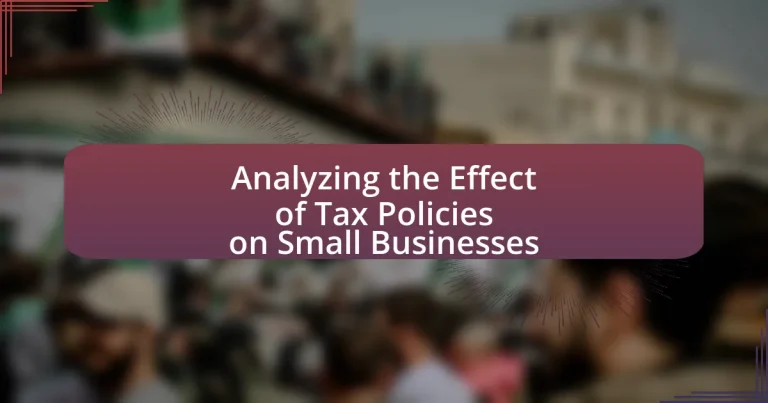Tax policies are critical regulations that determine the tax obligations of small businesses, significantly influencing their financial health, cash flow, investment decisions, and overall profitability. This article analyzes the impact of various tax policies, including income tax rates, payroll taxes, and local incentives, on small business growth and sustainability. It highlights the importance of understanding tax regulations for optimizing tax liabilities, avoiding compliance issues, and making informed financial decisions. Additionally, the article addresses common misconceptions about tax deductions and credits, the challenges small businesses face due to complex tax regulations, and strategies for effective tax planning to maximize benefits.

What are Tax Policies and Their Importance for Small Businesses?
Tax policies are regulations and laws that govern how much tax businesses must pay to the government. These policies are crucial for small businesses as they directly impact their financial health, influencing cash flow, investment decisions, and overall profitability. For instance, favorable tax policies, such as lower tax rates or tax credits, can enhance a small business’s ability to reinvest in growth and create jobs. Conversely, high tax burdens can limit resources available for expansion and innovation. According to the Small Business Administration, small businesses account for 99.9% of all U.S. businesses, highlighting the significance of tax policies in shaping the economic landscape and supporting entrepreneurship.
How do tax policies impact the financial health of small businesses?
Tax policies significantly impact the financial health of small businesses by influencing their cash flow, investment decisions, and overall profitability. For instance, lower tax rates can increase disposable income for small business owners, allowing them to reinvest in their operations, hire more employees, or expand their services. Conversely, higher tax rates can reduce available capital, leading to decreased investment and potential layoffs. According to the National Federation of Independent Business, tax-related issues consistently rank among the top concerns for small business owners, highlighting the direct correlation between tax policies and financial stability.
What are the key components of tax policies that affect small businesses?
The key components of tax policies that affect small businesses include tax rates, deductions, credits, compliance requirements, and incentives. Tax rates determine the percentage of income that small businesses must pay, directly impacting their profitability. Deductions allow businesses to reduce taxable income by accounting for expenses such as salaries, rent, and supplies, which can significantly lower tax liabilities. Tax credits provide direct reductions in tax owed, incentivizing specific behaviors like hiring employees or investing in renewable energy. Compliance requirements dictate the administrative burden on small businesses, influencing their operational efficiency and costs. Lastly, incentives, such as tax holidays or grants, encourage investment and growth within specific sectors or regions, shaping the overall business landscape. These components collectively influence the financial health and strategic decisions of small businesses.
How do tax rates influence small business profitability?
Tax rates significantly influence small business profitability by directly affecting the amount of income that businesses retain after taxes. Higher tax rates reduce the net income available for reinvestment, expansion, and employee compensation, which can hinder growth and operational capacity. For instance, a study by the National Federation of Independent Business found that 75% of small business owners consider taxes a major concern, impacting their investment decisions. Additionally, the Tax Cuts and Jobs Act of 2017 reduced the corporate tax rate from 35% to 21%, which led to increased profitability for many small businesses, as evidenced by a 2018 survey indicating that 60% of small businesses reported increased earnings due to lower tax burdens.
Why is understanding tax policies crucial for small business owners?
Understanding tax policies is crucial for small business owners because it directly impacts their financial health and compliance obligations. Knowledge of tax regulations enables small business owners to optimize their tax liabilities, ensuring they take advantage of available deductions and credits, which can significantly reduce their overall tax burden. For instance, the IRS reported that small businesses can deduct expenses such as home office costs and business-related travel, which can lead to substantial savings. Additionally, understanding tax policies helps small business owners avoid costly penalties associated with non-compliance, as the IRS imposes fines for late filings and underreporting income. Therefore, a solid grasp of tax policies is essential for effective financial management and long-term sustainability of small businesses.
What common misconceptions do small business owners have about tax policies?
Small business owners often mistakenly believe that all business expenses are fully deductible, which is not always the case. Certain expenses, such as meals and entertainment, have limitations on deductibility, and others may require specific documentation or meet particular criteria to qualify. According to the IRS guidelines, only 50% of business meal expenses are deductible, and entertainment expenses are generally not deductible at all. This misunderstanding can lead to inaccurate tax filings and potential penalties.
How can tax policy knowledge lead to better financial decisions?
Tax policy knowledge enables individuals and businesses to make informed financial decisions by optimizing tax liabilities and identifying available deductions and credits. Understanding tax regulations allows small business owners to strategically plan their finances, ensuring compliance while maximizing savings. For instance, knowledge of the Qualified Business Income deduction can lead to significant tax savings, as it allows eligible businesses to deduct up to 20% of their qualified business income. This strategic approach not only enhances cash flow but also supports long-term financial planning and investment decisions.

What Types of Tax Policies Affect Small Businesses?
Tax policies that affect small businesses include income tax rates, payroll taxes, sales taxes, and property taxes. Income tax rates directly influence the profitability of small businesses, as higher rates reduce net income. Payroll taxes, which are contributions to social security and Medicare, impact labor costs and can affect hiring decisions. Sales taxes can influence consumer purchasing behavior, thereby affecting small business revenues. Property taxes, levied on real estate owned by businesses, can significantly impact operational costs. According to the Small Business Administration, tax policies can account for up to 30% of a small business’s operating expenses, highlighting their critical role in business sustainability and growth.
What are the different types of taxes that small businesses must consider?
Small businesses must consider several types of taxes, including income tax, self-employment tax, payroll tax, sales tax, and property tax. Income tax applies to the profits earned by the business, while self-employment tax is relevant for sole proprietors and partners, covering Social Security and Medicare taxes. Payroll tax is imposed on wages paid to employees, and sales tax is collected on goods and services sold. Property tax is levied on real estate owned by the business. Each of these taxes has specific regulations and rates that vary by jurisdiction, impacting the overall financial obligations of small businesses.
How do income taxes differ from sales taxes for small businesses?
Income taxes and sales taxes differ fundamentally in their application to small businesses. Income taxes are levied on the profits a business earns, meaning that the tax is calculated based on the net income after expenses are deducted. In contrast, sales taxes are imposed on the sale of goods and services, calculated as a percentage of the sale price at the point of transaction, regardless of the business’s profitability.
For example, in the United States, federal income tax rates for small businesses can range from 10% to 37% based on income brackets, while sales tax rates vary by state, typically ranging from 4% to 10%. This distinction means that a small business could incur sales tax liabilities even when it is not profitable, whereas income tax liabilities only arise when the business generates a profit.
What role do payroll taxes play in small business operations?
Payroll taxes are a significant financial obligation for small businesses, impacting their cash flow and overall operational costs. These taxes, which include Social Security, Medicare, and federal and state unemployment taxes, must be withheld from employee wages and matched by the employer, creating a dual burden. According to the IRS, employers are responsible for paying 6.2% for Social Security and 1.45% for Medicare on employee wages, in addition to the amounts withheld from employees. This requirement can strain the budgets of small businesses, particularly startups or those with limited revenue, as they must ensure compliance while managing other expenses. Furthermore, failure to accurately calculate and remit payroll taxes can lead to penalties and interest, further complicating financial management for small businesses.
How do local, state, and federal tax policies vary for small businesses?
Local, state, and federal tax policies vary significantly for small businesses in terms of rates, regulations, and incentives. Local tax policies often include property taxes, sales taxes, and local business licenses, which can differ widely between municipalities. For example, some cities may offer tax breaks to attract small businesses, while others impose higher local taxes. State tax policies typically encompass income taxes, sales taxes, and various business taxes, with rates and regulations varying from state to state; for instance, some states have no income tax, which can benefit small businesses significantly. Federal tax policies include corporate tax rates and deductions available to small businesses, such as the Qualified Business Income deduction, which allows eligible businesses to deduct up to 20% of their qualified business income. These differences in tax structures can influence a small business’s operational costs and overall profitability, making it essential for business owners to understand the specific tax implications at each level of government.
What are the implications of local tax policies on small business growth?
Local tax policies significantly influence small business growth by affecting operational costs and investment decisions. For instance, higher local taxes can reduce profit margins, making it challenging for small businesses to reinvest in their operations or expand. Conversely, tax incentives or lower rates can stimulate growth by providing additional capital for hiring, marketing, and innovation. According to a study by the National Federation of Independent Business, small businesses in areas with favorable tax policies reported a 20% higher growth rate compared to those in high-tax regions. This demonstrates that local tax policies play a crucial role in shaping the economic landscape for small enterprises.
How do state tax incentives support small business development?
State tax incentives support small business development by reducing the financial burden on these enterprises, allowing them to reinvest savings into growth initiatives. For instance, tax credits, deductions, and exemptions can lower operational costs, enabling small businesses to allocate more resources toward hiring employees, expanding facilities, or investing in technology. According to the National Federation of Independent Business, states that implement tax incentives often see increased small business formation rates, which contributes to job creation and economic growth. Additionally, a study by the Small Business Administration found that targeted tax incentives can lead to a 20% increase in small business revenue within three years, demonstrating their effectiveness in fostering a conducive environment for small business success.

What are the Effects of Tax Policies on Small Business Growth and Sustainability?
Tax policies significantly influence small business growth and sustainability by affecting cash flow, investment decisions, and overall economic viability. For instance, lower tax rates can enhance profitability, allowing small businesses to reinvest in operations, hire more employees, and expand their services. Conversely, higher tax burdens can constrain resources, leading to reduced investment in innovation and growth. According to a study by the National Federation of Independent Business, 75% of small business owners cite taxes as a major concern impacting their growth potential. Additionally, tax incentives, such as credits for research and development, can stimulate innovation and sustainability efforts, further supporting long-term viability.
How do tax policies influence small business hiring practices?
Tax policies significantly influence small business hiring practices by affecting the financial resources available for employment. When tax incentives, such as credits or deductions for hiring certain demographics or for expanding operations, are implemented, small businesses are more likely to increase their workforce. For instance, a study by the National Federation of Independent Business found that 60% of small business owners reported that tax incentives positively impacted their hiring decisions. Conversely, higher tax rates can constrain cash flow, leading to reduced hiring or layoffs, as businesses prioritize maintaining profitability over expanding their workforce. Thus, tax policies directly shape the hiring landscape for small businesses by either incentivizing growth or imposing financial burdens.
What tax incentives exist for small businesses that hire new employees?
Small businesses that hire new employees can benefit from several tax incentives, including the Work Opportunity Tax Credit (WOTC), which provides a credit for hiring individuals from specific target groups facing barriers to employment. This credit can be as much as $2,400 per eligible employee, increasing to $9,600 for certain veterans. Additionally, the Small Business Health Care Tax Credit allows small businesses that provide health insurance to their employees to claim a credit of up to 50% of premiums paid, incentivizing the hiring of new staff. Furthermore, some states offer their own tax credits or deductions for businesses that create jobs, which can vary widely by location. These incentives are designed to encourage job creation and support small business growth.
How can tax deductions impact employee compensation strategies?
Tax deductions can significantly influence employee compensation strategies by allowing businesses to allocate more resources towards employee benefits and salaries. When companies can deduct certain expenses, such as health insurance premiums or retirement contributions, they effectively reduce their taxable income, which can free up capital for enhancing employee compensation packages. For instance, a study by the National Bureau of Economic Research found that businesses that utilize tax deductions for employee benefits often see an increase in employee satisfaction and retention, as these benefits become more financially feasible. This strategic use of tax deductions enables small businesses to remain competitive in attracting and retaining talent while managing their overall financial health.
What challenges do small businesses face due to tax policies?
Small businesses face significant challenges due to tax policies, including high compliance costs, unpredictable tax liabilities, and limited access to tax incentives. Compliance costs can consume up to 40% of a small business’s accounting budget, making it difficult for them to allocate resources effectively. Unpredictable tax liabilities arise from frequent changes in tax laws, which can lead to financial instability and hinder long-term planning. Additionally, small businesses often struggle to access tax incentives that are more readily available to larger corporations, limiting their ability to invest in growth and innovation. These challenges collectively impact the financial health and operational efficiency of small businesses.
How do complex tax regulations affect small business compliance?
Complex tax regulations significantly hinder small business compliance by increasing the administrative burden and costs associated with tax preparation and filing. Small businesses often lack the resources and expertise to navigate intricate tax codes, leading to a higher likelihood of errors and potential penalties. According to a 2020 report by the National Federation of Independent Business, 60% of small business owners cited tax compliance as a major concern, indicating that complexity in tax regulations directly impacts their ability to operate efficiently. Furthermore, the IRS reported that small businesses face a compliance cost that is approximately 45% higher per dollar of revenue compared to larger firms, underscoring the disproportionate impact of complex tax regulations on small business compliance.
What are the financial burdens of tax liabilities on small businesses?
Tax liabilities impose significant financial burdens on small businesses by reducing their available cash flow and increasing operational costs. Small businesses often face higher effective tax rates compared to larger corporations, which can limit their ability to reinvest in growth or manage day-to-day expenses. According to the National Federation of Independent Business, 30% of small business owners cite taxes as a major concern, impacting their hiring and investment decisions. Additionally, compliance costs associated with tax preparation and filing can consume up to 40% of a small business’s total tax liability, further straining their financial resources.
What strategies can small businesses employ to navigate tax policies effectively?
Small businesses can navigate tax policies effectively by implementing strategic tax planning, maintaining accurate financial records, and utilizing available tax credits and deductions. Strategic tax planning involves understanding current tax laws and regulations to optimize tax liabilities, which can lead to significant savings. Accurate financial records ensure compliance and facilitate easier tax preparation, reducing the risk of audits and penalties. Additionally, small businesses can take advantage of tax credits and deductions, such as the Small Business Health Care Tax Credit, which can reduce tax burdens and improve cash flow. According to the IRS, small businesses that engage in proactive tax planning can save an average of 20% on their tax liabilities.
How can small businesses leverage tax planning to maximize benefits?
Small businesses can leverage tax planning to maximize benefits by strategically utilizing available deductions, credits, and tax deferral opportunities. By understanding the tax code, small businesses can identify eligible expenses such as operational costs, employee benefits, and capital investments that can be deducted, thereby reducing taxable income. For instance, the IRS allows small businesses to deduct up to $1,080,000 in equipment purchases under Section 179, which can significantly lower tax liabilities. Additionally, small businesses can benefit from tax credits like the Work Opportunity Tax Credit, which incentivizes hiring individuals from certain target groups. Effective tax planning also involves timing income and expenses to optimize tax outcomes, such as deferring income to a future tax year when the business expects to be in a lower tax bracket. This approach not only enhances cash flow but also ensures that small businesses retain more earnings for reinvestment and growth.
What resources are available for small businesses to understand tax policies?
Small businesses can utilize various resources to understand tax policies, including the IRS website, which provides comprehensive guides and publications tailored for small business owners. Additionally, the Small Business Administration (SBA) offers resources and workshops focused on tax compliance and planning. Local chambers of commerce often host seminars and provide materials on tax-related topics. Furthermore, professional organizations such as the National Federation of Independent Business (NFIB) and the American Institute of CPAs (AICPA) offer insights and updates on tax legislation affecting small businesses. These resources are essential for navigating the complexities of tax policies effectively.





